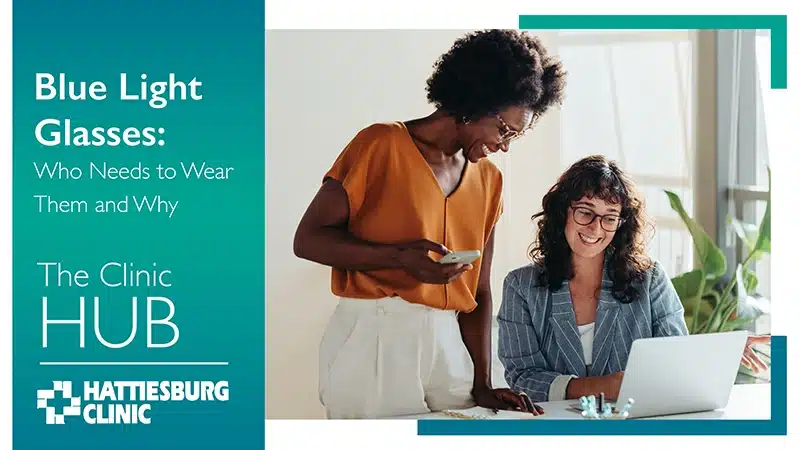Blue Light Glasses: Who Needs Them and Why
In today’s digital age, it is hard to escape screens – whether it is our smartphones, computers, televisions or tablets. The amount of time spent in front of these digital devices has dramatically increased, which has led to concerns about the potential harm caused by prolonged exposure to blue light. In response to these concerns, blue light glasses have emerged as a popular solution. But what exactly do these glasses do, and how do you know if you need them?
What is Blue Light?
Blue light is a type of high-energy visible (HEV) light that is emitted by the sun and artificial sources like digital screens and LED lighting. It has a short wavelength, making it one of the highest-energy wavelengths in the visible spectrum. While all visible light, including blue light, contributes to how we see and perceive the world, blue light is unique because of its intensity and potential effects on human health. Unlike longer wavelengths like red or yellow light, blue light scatters more easily and can disrupt our sleep cycles, potentially contributing to digital eye strain, headaches and even macular degeneration over time.
There are two primary sources of blue light:
- Natural Sources: The largest source of blue light is the sun. Exposure to natural sunlight is essential for regulating circadian rhythms, which are our body’s internal clocks. Exposure to blue light during the day keeps us alert, enhances cognitive function and lifts our mood.
- Artificial Sources: Digital devices, including smartphones, tablets, computers and televisions, as well as LED and fluorescent lighting, emit blue light. The levels of blue light from screens are lower than sunlight, but the concern lies in the duration and proximity of exposure.
How Do Blue Light Glasses Work?
Blue light glasses act as a shield between blue light and your eyes. They are specifically designed to block or filter out blue light. The most common types include clear blue light glasses, which block a small percentage of blue light (often around 10 to 30 percent) and are ideal for everyday use without changing the appearance of colors. Then there are yellow-tinted lenses that block a higher percentage of blue light, usually between 50 and 70 percent, and are great for extended screen time or use in dim lighting conditions. The third type is amber or orange-tinted glasses, which filter out almost all blue light (up to 99 percent) and are often used for people with sleep issues or nighttime use, as they significantly reduce the impact of blue light on circadian rhythms. Each type serves a different need depending on how much exposure you have and your sensitivity to blue light.
Who Should Wear Blue Light Glasses?
Not everyone needs blue light glasses, but they can be a helpful tool for specific groups of people. Those who spend significant time on screens or experience symptoms of digital eye strain benefit the most.
- Frequent Computer Users: If you spend most of your day in front of a computer, tablet or smartphone, you are a prime candidate for blue light glasses. Extended screen time can lead to digital eye strain, causing symptoms like dry eyes, headaches and blurred vision. Blue light glasses can help filter out some of the blue light. They reduce the strain on your eyes and keep you more comfortable during long working hours.
- Night-Time Screen Users: Exposure to blue light in the evening can trick your brain into thinking it is still daytime, making it harder to fall asleep. If you often use devices before bed, blue light glasses promote better sleep by reducing exposure.
- Migraine Sufferers: Some people are more sensitive to blue light than others. If you are prone to migraines, or if you notice that bright screens easily irritate your eyes or cause discomfort, wearing blue light glasses helps reduce the intensity of this strain. Blue light can trigger headaches for some and filtering it out can lead to a noticeable reduction in symptoms.
- Children: The growing use of tablets, computers and smartphones among children can cause concern for parents because of the impact blue light has on developing eyes. Blue light glasses designed specifically for children can help minimize digital eye strain and support better sleep patterns.
Blue light glasses may be worth trying if you spend long hours in front of screens and experience discomfort or difficulty sleeping. However, they should not be relied upon as the sole solution for eye strain or sleep issues. Combining blue light glasses with other healthy screen habits, such as taking regular breaks, adjusting screen settings and limiting screen time before bed, is the most effective way to mitigate the effects of digital device use.
Hattiesburg Clinic offers two full-service optical departments for customers needing blue light glasses, sunglasses, contacts and more. Both locations are staffed by knowledgeable professionals who work closely with our optometrists and ophthalmologists to deliver the best solutions for your vision needs. To learn more about the services they offer, visit www.hattiesburgclinic.com/optical-shops.
###
